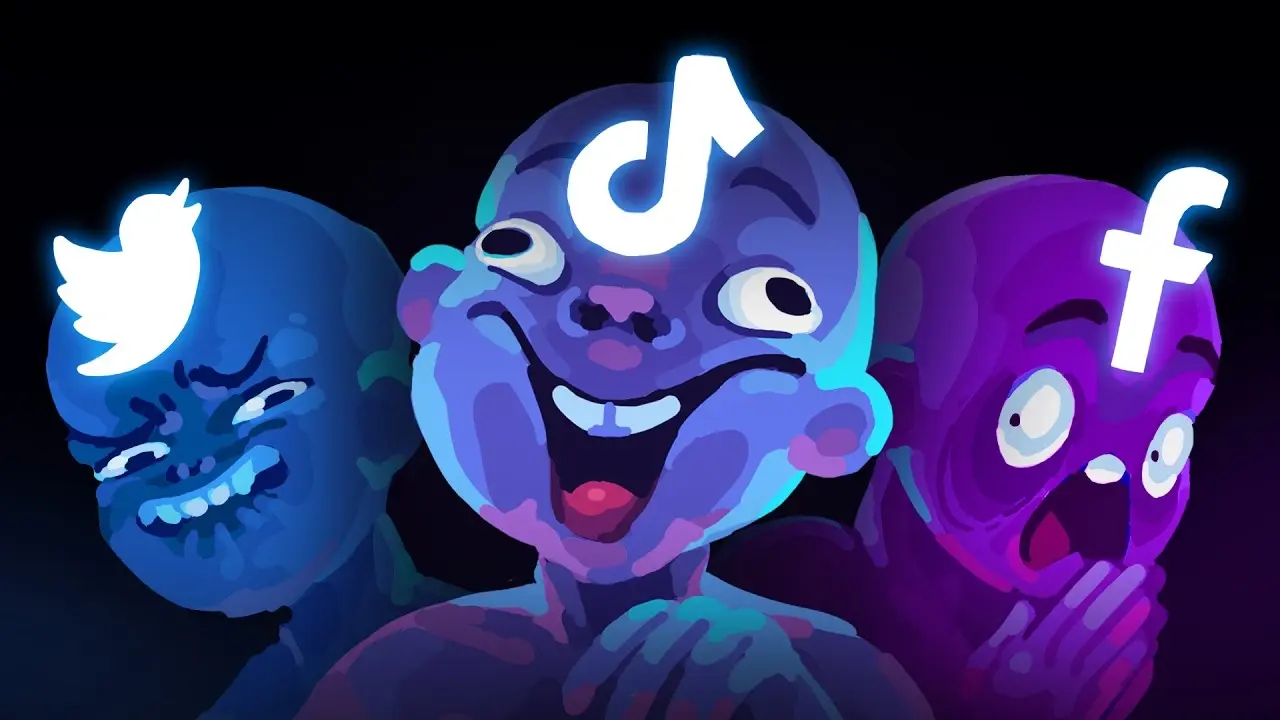Why are people weaving social media and the internet into a single thread? The internet is so vast, social media makes up a tiny sliver of it.
The real problem with the internet isn’t Facebook or Twitter or Reddit, it’s the fact the entire experience is pretty much controlled by Microsoft and Google. As they shape your content, lock you out of areas and generally dictate what’s “legal” or even what gets found during your searches.
It’s no longer an information superhighway but rather turning into a giant storefront. And that’s the problem. I search for anything and the first 3 pages are Amazon link backs. Or fake websites with AI generated content used only for ad impressions.
Facebook and the like definitely erode some parts, but as a whole, there is way more fuckery going on by big tech.
And this isn’t even mentioning the tracking and fingerprinting and violations to privacy and security we are all promised.
Why are people weaving social media and the internet into a single thread? The internet is so vast, social media makes up a tiny sliver of it.
Because to most people outside Lemmy the “internet” (by which they mean the world wide web but that’s me being a pedant) IS social media. There might as well not be anything outside the walled gardens of social media to them because they’ve been conditioned to only stay on one, maybe two platforms for years at this point. The old “what’s a browser?” question these days gets answered with “I don’t need a browser I have Facebook”. Completely nonsensical to us but to them it’s totally natural. Not being derogatory about them or anything but the 60k lemmy users and however many million on Reddit are not the majority. Facebook with it’s 3 billion (with a b) users, IS the majority of the internet.
I recently (yay Black Friday Week!) got asked by someone in their 70s, who never worked with a computer, to help them pick a laptop:
- Me: OK, so what do you want to do with it?
- Them: I just want to login to the internet.
- Me: […] You can do that on your phone.
- Them: But how do I go onto the internet.
- Me: Use the browser to go to the webpage you want, or search for it in Google.
- Them: So I have Internet on the phone?
- Me: Yes, otherwise you wouldn’t be able to watch YouTube, read your mail, or access Facebook.
- Them: [unconvinced] And should I upgrade to a smartphone?
- Me: [facepalm] You already have a smartphone.
- Them: Oh, and I don’t want TikTok.
- Me: You don’t have TikTok.
- Them: [pointing at the YouTube icon] This isn’t TikTok?
- Me: No, that is YouTube [damned be the Shorts]
They still want a laptop, which is fine, even if they don’t know what for (“not for gaming, not for fancy rocket stuff like you do”) after having showed them some basic office stuff on mine. Still not sure whether to recommend them a Chromebook, a tablet, or what.
deleted by creator
If they don’t know what they’re going to use it for, I’d focus on practical things most non-technical people use laptop for:
- Fair battery life to carry it around.
- Operating system that does auto-updates, needs little to no administration.
- SSD so the thing feels fast, and starts quickly. May not need a large storage capacity.
- Built-in webcam for video calls with relatives, etc.
The rest can be done on the software side:
- To browse safely, install security tools (antivirus, browser extensions like privacy badger) and verify auto-udate is on.
- Install an office suite (et Libre Office). Even if they don’t write documents, they’ll probably need to read them.
- If using Windows, tweaks settings to disable abnoxious things like ads, telemetry.
- Backup software. Ideally with automatic remote backups. Window’s built-in backup sucks.
The real problem with the internet isn’t Facebook or Twitter or Reddit, it’s the fact the entire experience is pretty much controlled by Microsoft and Google. As they shape your content, lock you out of areas and generally dictate what’s “legal” or even what gets found during your searches.
I agree the Google and MS are a problem, but Facebook, Twitter, Reddit are also a problem, albeit a different one.
Yeah not saying they aren’t shit. Just that the internet isn’t just social media. I surf with mullvad blocking all nuisances (social media included) and I don’t even really feel its effects unless I actually try to visit facebook.com or equivalent.
I think this is where you’re wrong. Facebook, together with google, ms, apple and amazon, are building all the tech nowadays and thus shaping the internet according to their priorities, and this is the biggest problem.
Apple is a hardware company. Over 90% of their cash comes from hardware. Latest figures show that about 6-8% are from services. Aside from making a browser that’s quite popular on mobile, they really have little to no control on the net.
Their partners certainly do, but they are not a software company. They have nowhere near the impact Google or Microsoft do because those two are both service companies and both actually control and own giant slices of the net. Google has shaping the net’s infrastructure for decades now.
Not saying Apple doesn’t influence in other ways, but is just a spec compared to the companies that actually own parts of the nets backbone.
It’s going to be like old telecom soon, where the companies that own the physical lines have all the control. And that’s scary. I don’t want kids growing up using Google Internet or Microsoft AllNet to access the web.
Why are people weaving social media and the internet into a single thread?
Because when people say the internet sucks, they’re not talking about TCP/IP or HTTPS or SSH or FTP. They’re talking about their experience interacting with websites and other people online, i.e. the social aspects, essentially the World Wide Web portion (but also hardware as a service). Everything you mentioned is in that tiny sliver, and is what people take issue with.
the entire experience is pretty much controlled by Microsoft and Google
and cloudflare
I worry about that shit more than I do what social is doing. The fact Meta, Google, MS, etc can control actual parts of the internet is just beyond wild to me.
Go capitalism 🙃
Doesn’t seem to matter where you go these days, you still run into cloudflare, somewhere along the chain. They’re omnipresent in a way other companies aren’t.
Pain in the ass sometimes, but god damn do they make great services.
The real problem with the internet isn’t Facebook or Twitter or Reddit, it’s the fact the entire experience is pretty much controlled by Microsoft and Google
I think the real problem is that the entire Internet is basically just a dozen multi-billion Big Tech companies and the entire “Internet economy” is so tightly weaved into advertising money.
Yeah what a future! Literally everywhere you look or turn, there’s someone yelling in your ear for cash. Can’t wait 🙃
It’s honestly wild that our species has gotten here. When are we setting up on Mars again??
What’s really wild is that you don’t have to go that far into the past (just ca. 20 years) when the Internet was all about Information wanting to be Free. It was hopeful time of people coming together around new technology. There were a lot new businesses with wild innovations.
And then, just in a decade it was all gone. Replaced by unregulated behemoths that merged until there’s a dirty dozen left, controlling most of global money and information.
Enshittification of the Internet.
Super not enthused with how centrist this is. Comes off as more of the “can’t we all just get along and live in unity??” stuff people say, when really they mean “the left needs to chill and stop making everything a big deal.”
Kinda hard to just ‘get along’ when the other side is trying to destroy democracy and strip large portions of the population of their basic human rights.
I mostly agree with you.
But I also think it’s important to think of the neighbors we disagree with very differently than how we view right wing politicians and corporate executives. Our neighbors may have some shitty opinions and ignorant positions, but they might be decent people at heart. No right wing politician or billionaire CEO is going to be decent at heart.
I’m not sure where you live, but living/growing up in the south… I can tell you that those beliefs run deep. Deep deep deep. Deeper than you can fix by just being pleasant to your neighbor.
If you try to talk to them with kindness and openness, they dig in their heels and start spewing fox news talking points like it’s the most obvious thing in the world (I’m pretty sure they like it so much because it confirms every awful belief they already had). Try to present different sources, they’re rejected as fake news. I’ve tried everything with people around here since before 2016 and nothing seems to help. Mostly I just keep to myself.
Living in the south, if you’re not indoctrinated, is very isolating. Even living in the cities doesn’t really help. You still need to dig deep and look carefully for people who don’t think you deserve fewer rights.
Edit: thinking about it more, I think the isolation is the point, and it’s how so many people in my state believe some of the same basic things when it comes to religion and politics. You learn pretty young around here that if you don’t get with the program, you’re not going to have many friends. If you didn’t go to church, especially, you lost out on most of the community’s socializing for the week. It feels very cliquey in the smaller towns especially, almost by design.
It seems that americans think the entire world is the american south. Generally in more civilised places outside of the U.S, people care less about other people’s beliefs.
I definitely don’t? I was just providing my experience for the place I live. Obviously not all places are the south…? And good for you on your ‘more civilized place’, but we’re not talking about those areas.
Seems to me that, to solve rent crisis, Americans should just move into Europeans’ heads, since we seem to live there rent free already.
I think that was a stab at you saying “living in the south” as if it automatically meant south of the USA. So your US-centric world view shines through. I think no one wanted to attack your world view per se, but rather your bias.
And regarding your second comment, why so passive-aggressive? Obviously the US lives in everyone’s head rent free because it messes around with the whole world. Don’t get offended by people trying to point out that there is more in the world than one single country.
I get that, I live in the south of my country too, but only the US feels entitled enough to say “the south” and expect the whole world to know where they are.
I guess it adds to the problem that it’s very context specific. When you are in your country talking in your mothertongue with someone, you would probably only say “the south” to refer to the south of your country (or another by society predefined south).
And while we are on a mostly English-speaking platform inhabitated by mostly US people, I’ve heard US people throwing around US specific terms in a lot of different contexts/countries without checking the context they are in.
Right, but if the person I was talking originally to had said “I’m not from the US so I know nothing about it” it woulda been fine and I would have immediately apologized and we’d go from there. Having a nice chat.
That’s not what happened. Someone new chimed in with a pretty rude non-sequitur in the vein of ‘stupid Americans’. I don’t think I was particularly defensive or angry, but maybe it came off that way.
The phrasing of “more civilised places” in the comment you mention seems highly problematic to me, yes. I think the “stupid Americans” is your biased interpretation though.
Oh, btw I wouldn’t call people from the USA “Americans”, because it is just one of many countries in the Americas. Another blind spot in the US perspective.
I live in a third world country, what they’re saying is mostly accurate here too. Entire world isn’t Europe
Anyone who thinks their country is more “civilized” than to engage in bigotry is just revealing that they live in a bubble themselves.
Any neighbor whose beliefs and views lead them to look at Trump and say “yeah give me more of that!” can fuck right off.
People who want to destroy democracy are influenced by their brain too. But they do react more extremely than others.
The thesis here is consistent with people believing political violence is justified, with human brain’s tendency to form a “us vs them” mentality. But it doesn’t explain why some act more extreme and violently.
People react differently because of multiple factors, such as living through different circumstances, different cultures, being more or less subject to cognitive biases, seing more or less misinformation, … For instance if you see more misinformation about polical adversary being evil, AND your biases and culture makes you more likely to believe it.
That isn’t an excuse for any violence. Understanding these mechanisms may help prevent reduce violence or hate. That’s a worthy goal even if some groups have a much greater responsibility for political violence.
There’s a difference between violence never being desirable, and violence never being necessary. Calls for pacifism at all costs only serve those in power.
Many people live daily with violence being done to them and their communities, but are continually admonished against the wrong kinds of resistance…
Interesting video, makes a lot of sense. Just a couple of things to add:
In the old days of forums it’s worth remembering that people on the internet had more in common with each other than they do today - i.e. generally they were people who were in to computers.
What really gets me down these days is the extremely low-effort of posting everywhere you go. I think that partly comes from the impersonal nature of online communication. Nobody knows who anyone is any more.
I agree it would be better to go back to independent message boards but it’s a shame there’s no “call to action” - it would be nice but how do we get people to do it? This is a popular YouTube channel, it would be great if it started some kind of ball rolling.
I was posting low effort messages on BBS’s back in the 80s, and on the Usenet through the 90’s. The tradition continues.
I remember being told off by a moderator in the 90s for not writing full-sentence replies. You can’t even imagine that today. Of course back then, as the video touches on, if you didn’t like the culture or policies of a forum you just moved to another one, there were no cries of “censorship” because you choose where you want to be.
But I think that makes a good point, in the past people could choose whether they wanted to go on a forum for serious discussion, or a different forum for more casual low-effort posting. These days all these different “posting cultures” are forced to be together and end up annoying each other.
Eternal September
I completely agree with your assessment especially with how most social media these days really dumbs down the entry level effort needed to participate in discussions.
And to your point, participating on a BBS (which usually requires a more specific interest and consequently a similar engagement level) will generally reward you with a community that is more civil, friendly and worth frequenting.
I’m starting to think that Kurzgesagt is either paid media and/or propaganda. I really liked their well researched approach. But this one is straight out in your face. They outright deny the filter bubble that each one of us have experienced firsthand on corporate social media - and then blame you for the ill effects. Also, if you look at the imagery - the emoticons and especially the thumbs up symbol, they are trying to invoke memories of specific social media. It feels very much like they’re trying to garner sympathy for those antisocial-media.
BTW, this isn’t the first time their motives have been called into question. They have in the past, taken money from bigphrama to paint them as benevolent superheroes.
I don’t know why you would think they’re paid media or propaganda. It’s not like they’ve been paid over half a million dollars in 2015 by the Bill and Melinda Gates Foundation. Or like they received almost 3 million euros in 2022 by a “philanthropic” organization called Open Philanthropy that operates on the philosophical basis of “effective altruism,” an ideology which functionally equates to “let’s try to convince billionaires to throw some money at the poors instead of addressing systemic inequality,” and which totally cool people like Sam Bankman-Fried and Elon Musk have latched onto as belief systems. It’s also not like they’ve been given money by the conservative religious John Templeton Foundation, which was one of the largest financial contributors to the early climate change denial movement from 2003 to 2010.
Nope. Nothing to see here. Not in bed with big money or ideologically dubious organizations at all. /s
Have you read the sources? They are below the video. If you have, does the video misrepresent what’s in the sources?
You can find sources to justify any POV - there is no need to misrepresent anything. Something doesn’t automatically become right just because there’s a research paper on it. In fact, that is one of the tricks big companies use to mislead people and scuttle reforms. Look at the history of the tobacco industry, climate change, lead in gasoline, city planning and zoning, etc. There are countless examples.
What you say is true, but the internet bubble was also a paper. So if OP thinks that’s right and the papers saying it doesn’t exist are wrong, then I’d like to know why.
Simply having a “feeling” is as scientific as “god said so”.
They’ve always been pretty transparent about that kind of thing though haven’t they?
I don’t think they’re denying the filter bubble exists, just giving a different theory on why things have turned bad.
The video pretty concisely summarizes the latest scientific findings which say that the filter bubble does less to radicalize people than being confronted with opposing beliefs.
They squarely blame algorithms pushing anger for their role in that extremism though.
They haven’t been completely honest about their funding and biases. Second, they are trying to say that it’s human nature and not the filter bubble that’s responsible for things going bad. But those are not independent things. The algorithms created the filter bubble because they are designed to exploit human nature in order to trap human attention. That filter bubble in turn affects human nature in a negative way to cause polarization.
They’re not making an argument for the filter bubble though.
They are correct in the current interpretation of the effects of social media. Recent research has absolutely been pointing away from filter bubbles being a thing.
I also cannot believe how people looking like doing deep research for the topics cannot find out about different approaches than big corporate apps and old school way of forums/IRC.
As someone who got into Fediverse and FOSS social media months ago I have seen more great things already implemented and working than articles/vidoes like that are just making ideas about.
deleted by creator
Spoiler: It’s an ad.
The video includes an ad near the end. Like most video on YouTube, its creator rely on sponsors. Unfortunately they also placed the same ad at the beginning of the description. It’s kind of repulsive if the first thing you look at is the description.
I wish I could scrub or remove the ad from the description, but it’s automatically imported and I don’t see how to remove it.
The second half sounds a lot like an ad for Lemmy ^^
Algorithm-free solves a lot of problems.
Algorithm-free
I’m not sure you understand what an algorithm is. They’re simply a sequence of steps you apply to get some end result, comparable to eg. a recipe in baking.
Lemmy still has multiple ways for you to choose how posts are sorted; “hot”, “active”, “new” etc. Each of those is an algorithmic sorting, and there’s literally no other option except to have an algorithm that is used to determine which posts you see
edit: I think many people who think Lemmy is “algorithm-free” may mean that it has a transparent algorithm for post selection. It’s still an algorithm, but we can all go look at source code and documentation to be able to know exactly how it works – with eg. Facebook the exact workings of the post sorting algorithm is secret
I mean, I have a BS and MS in computer science, so you can use that as guidance as to whether or not I know what an algorithm is. :)
In this context, though, it should be clear that “The Algorithm” refers to a specific social networking algorithm that chooses the content you see in order to maximize advertising revenue.
So yes, Lemmy has algorithms that show different content based on your input, but that’s a wildly different animal. Notably, I’m the one deciding, and also they’re not trying to maximize ad revenue.
deleted by creator
Recommendation algorithms are great for discovering related information and new stuff.
I agree that open, controllable recommendation algorithms would be great. But right now using none of the currently widespread social media recommendation algorithms at all (and just matching keywords instead) makes for a less-abusive, more positive experience. IMHO.
New Kurtzgesagt video, a new opportunity to improve my filter bubble by blocking anyone who starts parroting factoids about their ties with the Gates Foundation 🤭 great day
deleted by creator
The video is kind of interesting… yes, I remember those days, and yes, there was a lot less bickering and fighting online.
The bickering was dumber and less serious but there was plenty of it on the newsgroups lol.
I was a forums guy back then. We did pick on each other, make stupid jokes on each other’s expenses, but it wasn’t taken to heart… like contruction workers roasting each other all day, that was mostly it 😂.
People had died and gang wars were made. That’s how popular anime and media got inspiration to get crime stories started.
Wow… didn’t actually know that… sad 😔.
Hey they changed the thumbnail. It used to be a dude shouting “I hate you!” at a PC.
YouTube has this thing where you can set multiple thumbnails (it will show a different one every time YouTube displays it) and see which one gets the most clicks, then use that one.
Removed by mod
@Hirom What is the origin of the problems?
To quote the video: “Your brain is stupid” (mine too) […] “our brain are not able to process the amount of disagreement we entounter on the social Internet”
deleted by creator
This video is highly recommended by Tournesol community:
[54🌻] Kurzgesagt – In a Nutshell: The Internet is Worse Than Ever – Now What?#Tournesol is an open-source web tool made by a non profit organization, evaluating the overall quality of videos to fight against misinformation and dangerous content.
This would have been helpful in, like, 2014, but better late than never I suppose. Interestingly, a recent skeptoid episode covered a similar topic
























